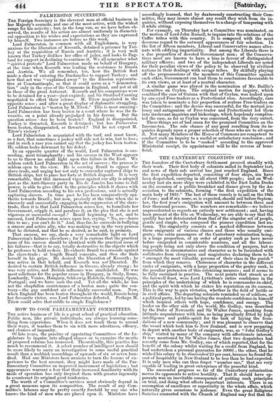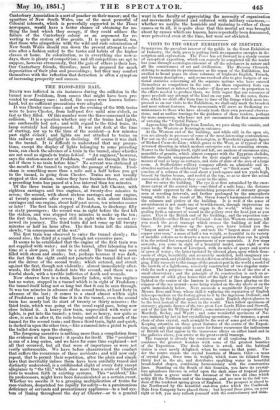THE CANTERBURY COLONISTS OF 1851.
TEE founders of the Canterbury Settlement proceed steadily with their work. Their first body of colonists sailed in September last, and news of their safe arrival has just reached England. since the first expedition departed, consisting of four ships,Six have been despatched, carrying in all about 1800 people ; and on Wed- nesday last six more ships were exhibited in the East India Docks on the occasion of a public breakfast and dinner given by the As- sociation to the colonists, forming " the first expedition of the main body of 1851." The last of these vessels is to sail on the 18th of June; and if six more, as is expected, should sail before Septem- ber, the first year's emigration will amount to between three and four thousand persons. The numbers are remarkable—we believe unprecedented as regards an entirely new settlement ; and, having been present at the fête on Wednesday, we are able to say that the quality has not deteriorated from that of the singular set of people, gentle and simple, who composed the pioneer expedition last au- tumn. The singularity consists of a marked difference between these emigrants of various classes and those who usually, emi- grate ; the cabin passengers of the Canterbury colonization being, in a large proportion, of an order of gentry such as have never before emigrated in considerable numbers, and all the labour- ing people being not only above the condition of paupers, but so respectable in circumstances and character as to be furnished with certificates from clergymen and magistrates declaring them to be "amongst the most valuable persons of their class in the parish" from which they remove. Choiceness of character in the different ranks of emigrants, with a large proportion of the gentxy rank, is the peculiar pretension of this colonizing measure ; and it seems to be fully sustained in practice. The next points that struck us at the farewell feast, were Lord Lyttelton's entire confidence in the principles of the undertaking of which he is commander-in-chief, and the spirit with which he stakes his reputation on its success. This is the way to gain victories, whether in the field of battle or in civil affairs. The departing colonists reminded us of soldiers, or a political party, led by one having the resolute confidence in himself which inspires others with hope, confidence, and energy. The leader on the other side of the world, Mr. Godley, was described by the Duke of Newcastle and Sir Walter James, speaking from intimate acquaintance with him, as being peculiarly fitted by high intelligence and public-spirit for the task of laying the foun- dations of a new community ; and it was pleasant to observe that the vessel which took him to New Zealand, and is now preparing to depart with another body of emigrants, was, as "John Godley's ship," visited by many of the company with affectionate interest. It was mentioned by Sir Walter James, that two despatches had recently come from Mr. Godley, one of which reported, that for the benefit of the colony whilst waiting for a credit from England, he had undertaken a personal guarantee for 5000/. ; the other, that he wished his salary to be diminished 25 per cent, because he found the cost of hospitality in New Zealand to be less than he had expected. It is only men who can thus forget "number one," that are very capable of leading in great enterprises of the peaceful kind. The successful progress so far of the Canterbury colonization moves its opponents to active hostility. That it should have op- ponents was an inevitable consequence of putting such principles on trial, and doing what affects important interests. There is an assumption of excellence or superiority in the whole affitir, which naturally gives occasions to jealousy. Even the great. Religious Societies connected with the Church of England may feel that the
Canterbury Association is a sort of poacher on their manor; and the squatters of New South Wales, one of the most powerful of Colonial interests, which is powerfully supported in the Times newspaper, would have a better chance of obtaining for no- thing the land which they occupy, if they could adduce the failure of the Canterbury colony as an argument for re- verting to the system of free grants. It is quite natural, too, that those who sympathize with the wild and rude colonization of New South Wales should run down the present attempt to colo- nize after a fashion suited to the tastes and habits of the higher classes at home. In colonization, as in everything else now-a- days, there is plenty of competition; and all competitors are apt to suppose, however erroneously, that the gain of others is their loss. Our Canterbury friends, therefore, must be prepared for much depreciation of their plan and proceedings ; but they may comfort themselves with the reflection that detraction is often a symptom of increasing prosperity and success.



























 Previous page
Previous page